Wat gaan we stemmen op 29 oktober? En waarom wegen de feiten voor veel kiezers minder zwaar dan sentimenten? Voor mij is dat een grote vraag. Zo ingewikkeld zijn de argumenten van radicaal-rechts namelijk niet te weerleggen.
In Nederland hoor je steeds vaker harde geluiden van radicaal-rechtse partijen. Ze beloven simpele oplossingen voor grote problemen: minder immigratie, lagere EU-bijdrage, geen klimaatbeleid, stikstofregels weg en vooral “eigen volk eerst”. Klinkt misschien aantrekkelijk, maar kloppen die argumenten wel? Als we beter kijken naar de feiten, zie je dat hun oplossingen vaak niet werken of zelfs schadelijk zijn.
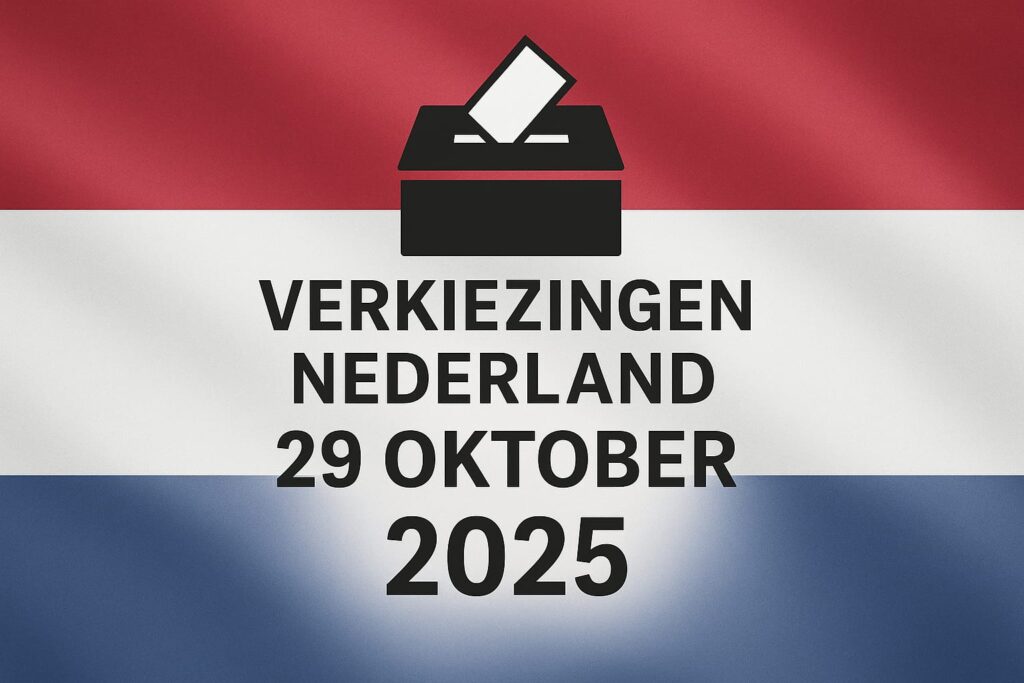
Immigratie
Wat radicaal-rechts zegt:
“Immigranten pikken onze banen.”
“Ze zorgen voor hogere criminaliteit.”
“Ze kosten alleen maar geld.”
Waarom dit niet klopt:
Veel sectoren in Nederland draaien juist op arbeidsmigranten: land- en tuinbouw, logistiek, zorg en horeca. Zonder hen zouden supermarkten leger zijn en prijzen hoger.
Onderzoeken van het CBS laten zien dat immigranten gemiddeld niet meer criminaliteit plegen dan Nederlanders. Bij sommige groepen is de oververtegenwoordiging vooral te verklaren door armoede, niet afkomst.
Immigranten betalen ook belasting en premies. Vooral hoogopgeleide migranten leveren economisch juist winst op.
Kortom: immigratie brengt uitdagingen, maar zonder migranten zou de Nederlandse economie piepen en kraken.
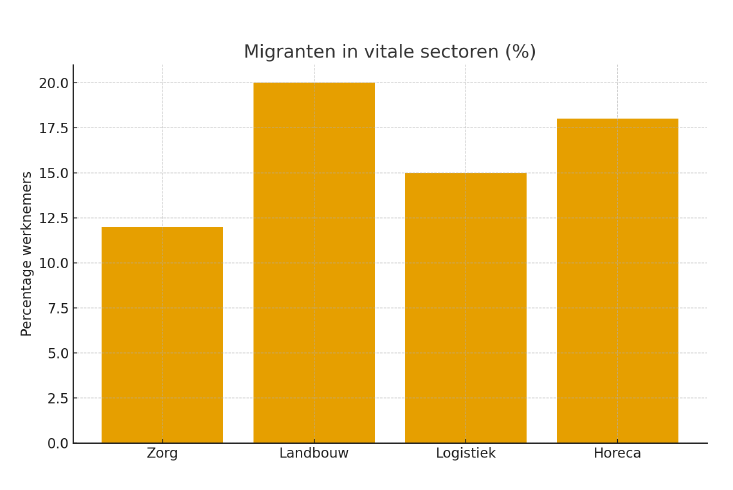
Asiel
Wat radicaal-rechts zegt:
“De asielinstroom is onhoudbaar.”
“Statushouders zorgen voor woningnood.”
“We moeten de Spreidingswet schrappen.”
Wat de feiten zijn:
Asiel en immigratie zijn niet hetzelfde.
Immigratie gaat over alle mensen die naar Nederland komen: voor werk, studie, gezinshereniging, óf asiel.
Asielzoekers zijn mensen die vluchten voor oorlog of vervolging en bescherming vragen op basis van het Vluchtelingenverdrag. Slechts een deel van de totale migratie is dus asiel.
Instroomcijfers (CBS/IND):
2021: ± 36.000 eerste asielaanvragen.
2022: ± 47.000 (mede door de oorlog in Oekraïne).
2023: ± 38.000.
2024: ± 32.000.
De meerderheid van de aanvragen in 2024 was afkomstig uit Syrië.
Ter vergelijking: de totale immigratie (alle redenen samen) was in 2023 ruim 403.000 mensen. Dat betekent dat asielzoekers maar een klein deel vormen van de totale instroom.
De meeste asielaanvragen in de EU worden in Duitsland gedaan. In 2024 waren dit er 229.750 (25% van het totaal). Daarna volgt Spanje met 164.035 aanvragen en Italië met 15.1120 aanvragen. Samen met Frankrijk en Griekenland vormen zij 82% van het totaal aantal asielaanvragen in de EU.
Hoeveel asielaanvragen krijgt Nederland vergeleken met Europa?
Nederland staat op een zevende plaats met 32.175 aanvragen, achter Duitsland, Spanje, Italië, Frankrijk, Griekenland en België. Je kunt ook kijken naar hoeveel asielverzoeken elk land ontvangt per 1.000 inwoners. Dan staat Nederland op de vijftiende plek. Dat is onder het Europese gemiddelde.
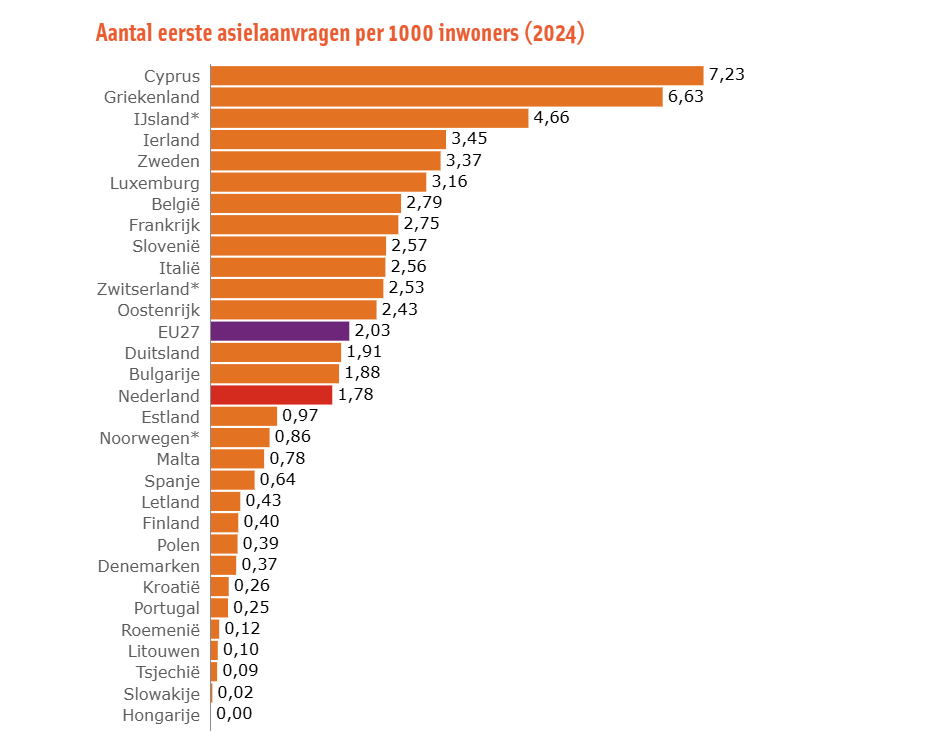
Spreidingswet (2024):
Deze wet zorgt ervoor dat alle gemeenten bijdragen aan opvang van asielzoekers, zodat niet een paar gemeenten of dorpen alles moeten dragen. Dit maakt de opvang eerlijker en beter georganiseerd.
Waarom de angst niet klopt:
De aantallen zijn hoog vergeleken met tien jaar geleden, maar nog steeds beheersbaar in verhouding tot de totale bevolking (±17,9 miljoen).
Nederland vangt relatief (per 1000 inwoners) minder asielzoekers op dan het Europese gemiddelde.
De Spreidingswet zorgt juist voor rust, omdat het voorkomt dat opvangcentra overvol raken en er tentenkampen ontstaan, zoals in Ter Apel.
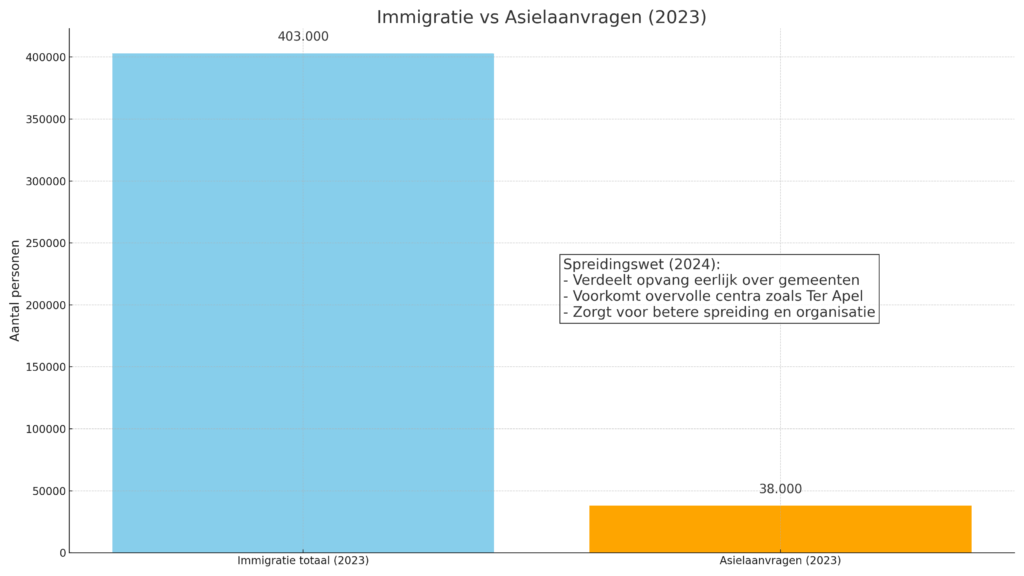
Woningmarkt
Wat radicaal-rechts zegt:
“De woningnood komt door asielzoekers en statushouders.”
Waarom dit niet klopt:
De woningnood is vooral ontstaan doordat er te weinig is gebouwd na de financiële crisis van 2008 en doordat de bevolking groeit.
Slechts 1 op de 30 nieuwe huurwoningen gaat naar statushouders. Het grootste deel wordt verhuurd aan Nederlanders.
Ook beleggers en dure nieuwbouw zorgen voor tekorten: huizen zijn vaak te duur voor starters.
De oplossing ligt dus bij sneller bouwen, betaalbare woningen maken en strengere regels voor beleggers – niet bij het sluiten van grenzen.
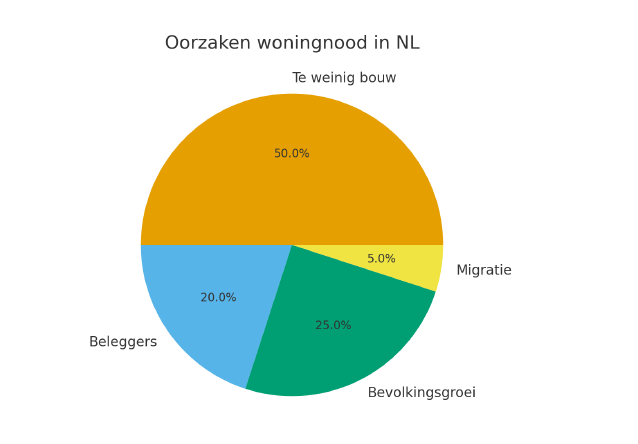
Klimaat
Wat radicaal-rechts zegt:
“Klimaatverandering bestaat niet, of is niet door de mens veroorzaakt.”
“Nederland hoeft niets te doen, wij zijn maar een klein land.”
Waarom dit niet klopt:
Wetenschappers zijn het wereldwijd eens: de aarde warmt op door broeikasgassen uit industrie, verkeer en landbouw. Dit is keihard bewezen met data.
Nederland is klein, maar rijk en een grote uitstoter per hoofd van de bevolking. We hebben dus een verantwoordelijkheid.
Bovendien: investeren in duurzame energie maakt ons minder afhankelijk van olie en gas uit landen als Rusland. Dat is ook veiliger en goedkoper op de lange termijn.
Dus: klimaatbeleid is geen hobby, maar noodzaak voor economie, veiligheid en toekomst.
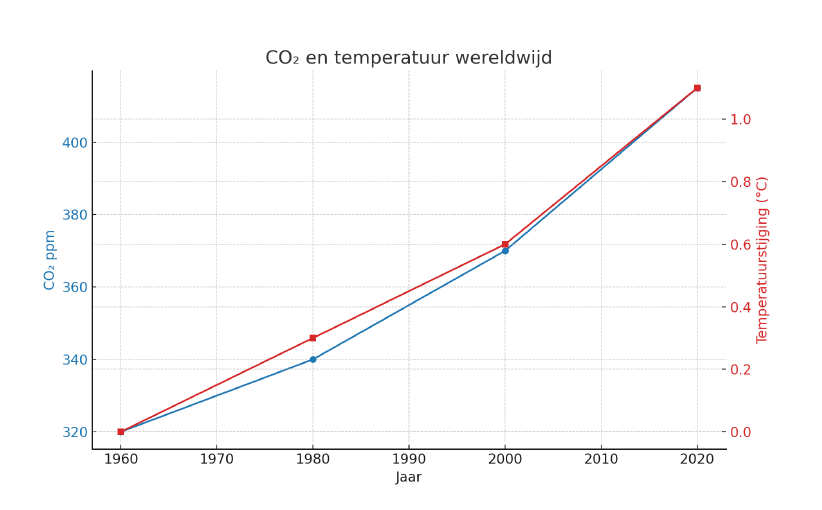
Stikstof
Wat radicaal-rechts zegt:
“Stikstofregels zijn overdreven, boeren moeten gewoon hun werk doen.”
Waarom dit niet klopt:
Nederland is het land met de hoogste stikstofuitstoot per hectare in Europa. Daardoor sterven natuurgebieden, verdwijnen planten en dieren, en komt onze gezondheid in gevaar.
Zonder beperking van stikstof stagneert de bouw. Dat betekent: nog minder huizen, nog minder infrastructuur.
Veel boeren willen zelf verduurzamen, maar hebben duidelijk beleid nodig.
De keuze is dus niet “boeren of natuur”, maar samen naar een gezonde balans.
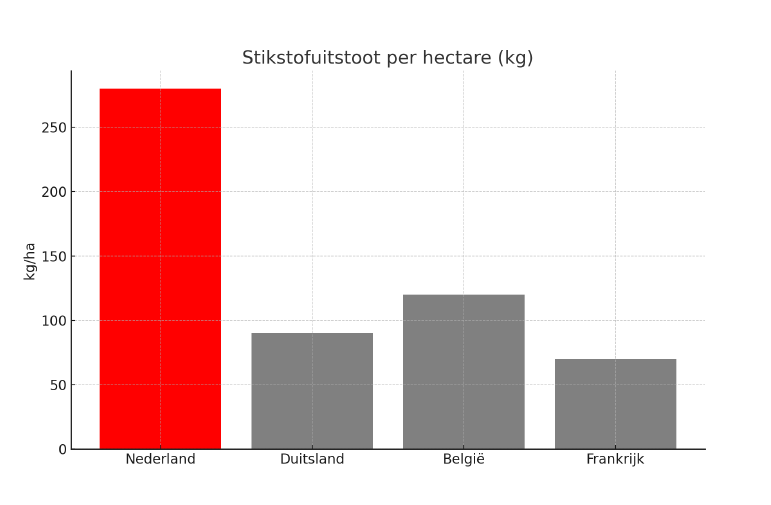
Europese Unie
Wat radicaal-rechts zegt:
“De EU kost ons alleen maar geld.”
“We moeten terug naar de gulden en onze grenzen dichtgooien.”
Waarom dit niet klopt:
Voor elke euro die Nederland inlegt, komt er ongeveer €1,70 terug via handel en subsidies. De EU is onze grootste afzetmarkt: bijna 75% van onze export gaat naar EU-landen.
Zonder EU zou Nederland veel armer zijn: banen in haven, landbouw en industrie hangen direct samen met open grenzen.
Terug naar de gulden zou leiden tot hogere rentes, lagere koopkracht en minder vertrouwen in Nederland.
De EU is dus niet perfect, maar voor Nederland is samenwerken economisch en geopolitiek veel slimmer dan alleen gaan.

Economie
Wat radicaal-rechts zegt:
“Belastingen omlaag, dan wordt iedereen rijker.”
“Minder regels voor bedrijven zorgt voor groei.”
Waarom dit niet klopt:
Lagere belastingen klinken leuk, maar betekenen ook minder geld voor zorg, onderwijs en veiligheid. Uiteindelijk betaalt de gewone Nederlander de prijs.
Te weinig regels leiden vaak tot misbruik en ongelijkheid. Denk aan de bankencrisis in 2008: te weinig toezicht veroorzaakte miljarden schade.
Investeren in onderwijs, innovatie en duurzaamheid levert juist economische groei én banen op.
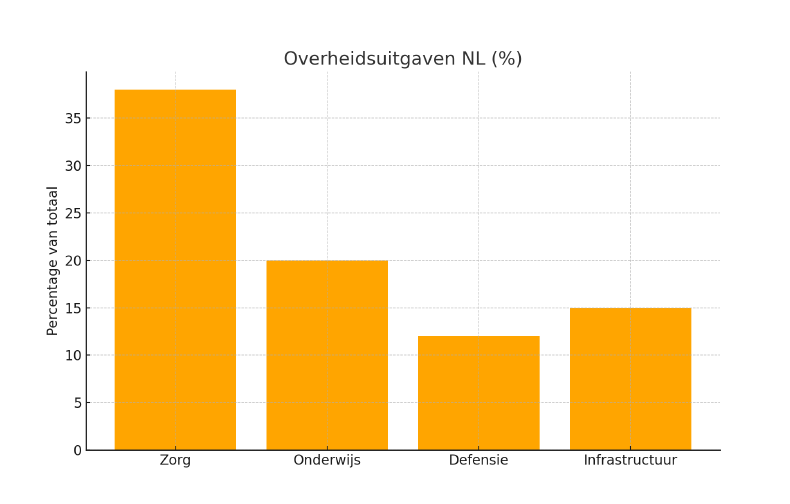
Conclusie
Radicaal-rechtse partijen bieden simpele antwoorden op moeilijke problemen. Maar echte oplossingen zijn nooit zo zwart-wit. Immigratie, klimaat, wonen en economie vragen om samenwerking, slimme investeringen en eerlijk beleid – niet om muren, haat of ontkenning van feiten.
Wie verder kijkt dan de korte leus, ziet dat de argumenten van radicaal-rechts vooral op emoties spelen en vaak niet kloppen. Feiten en toekomstgericht beleid brengen ons wél vooruit.
Bronnen
Immigratie / arbeidsparticipatie “Hoe verschillen arbeid en inkomen naar herkomst?” – CBS https://www.cbs.nl/nl-nl/dossier/dossier-asiel-migratie-en-integratie/hoe-verschillen-arbeid-en-inkomen-naar-herkomst-
Immigratie / arbeidsdeelname Arbeidsdeelname; migratieachtergrond, 2003-2022 – CBS https://www.cbs.nl/nl-nl/cijfers/detail/82809NED
Migranten integratie & positie Sociaaleconomische positie – Integratie en Samenleven 2024 https://longreads.cbs.nl/integratie-en-samenleven-2024/sociaaleconomische-positie/
EU / handelsvoordelen Handelsbaten van de EU en de interne markt – CPB (pdf-notitie) https://www.cpb.nl/sites/default/files/omnidownload/CPB-Notitie-Handelsbaten-van-de-EU-en-de-interne-markt.pdf
EU / economische baten Miljoenennota 2025 – handelsvoordelen EU (± 3,1 % bbp) – https://www.rijksfinancien.nl/miljoenennota/2025/3019155
Werkloosheid migranten Werkloosheid naar migratieachtergrond – CBS – https://www.cbs.nl/nl-nl/visualisaties/dashboard-arbeidsmarkt/werklozen/werkloosheid-naar-migratieachtergrond
Taalvaardigheid & arbeidspositie Nederlandse taalvaardigheid van migranten en hun positie op de arbeidsmarkt – CBS https://www.cbs.nl/nl-nl/longread/statistische-trends/2023/nederlandse-taalvaardigheid-van-migranten-en-hun-positie-op-de-arbeidsmarkt?onepage=true
EU / netto bijdrage discussie “We betalen 10 miljard per jaar voor EU, maar krijgen …” – Pointer https://pointer.kro-ncrv.nl/we-betalen-10-miljard-per-jaar-voor-eu-maar-krijgen-een-veelvoud-terug CBS – Hoeveel asielzoekers komen naar Nederland?
CBS – Hoeveel immigranten komen naar Nederland? – https://www.cbs.nl/nl-nl/dossier/dossier-asiel-migratie-en-integratie/hoeveel-immigranten-komen-naar-nederland
IND – Cijfers en publicaties over asiel – https://ind.nl/nl/over-ons/cijfers-en-publicaties
Rijksoverheid – Vraag en antwoord: asiel- en migratiecijfers – https://www.rijksoverheid.nl/onderwerpen/asielbeleid/vraag-en-antwoord/asiel–en-migratiecijfers
VluchtelingenWerk Nederland – Cijfers over vluchtelingen in Nederland – https://www.vluchtelingenwerk.nl/nl/nieuws-en-kennis/cijfers-over-vluchtelingen-nederland-europa-wereldwijd/cijfers-over-vluchtelingen-nederland
Rijksoverheid – Nieuwsbericht over aantal asielzoekers in 2024 – https://www.rijksoverheid.nl/actueel/nieuws/2024/04/05/aantal-asielzoekers-in-2024-in-lijn-met-eerdere-verwachting
CBS – Nieuwsbericht over minder asielverzoeken in 2024 – https://www.cbs.nl/nl-nl/nieuws/2025/06/minder-asielverzoeken-en-meer-nareizigers-in-2024





